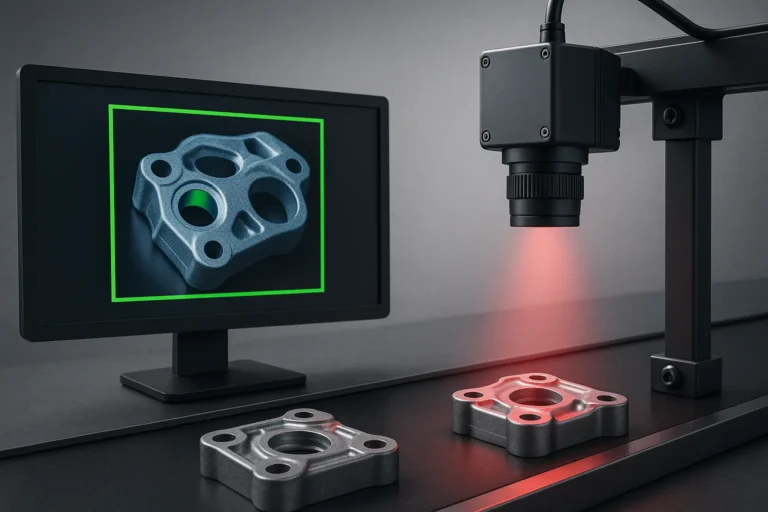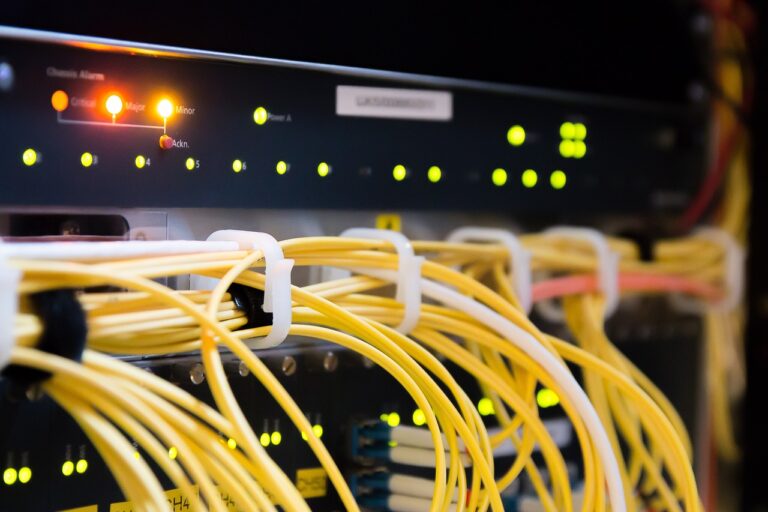What is CCTV? What Does a CCTV System Do?
CCTV, or Closed-Circuit Television, is a technology widely used for security and surveillance purposes. It operates through a closed network...
Devamını Oku

Artificial Intelligence (AI) and Machine Learning (ML) are set to revolutionize the future of industrial automation, enabling smarter, more adaptive systems that improve efficiency and decision-making. These technologies allow automated systems to go beyond pre-programmed tasks, learning from data and adapting to changing conditions, making them integral to the future of industrial processes.
One of the most significant impacts of AI and ML in industrial automation is the ability to predict equipment failures before they occur. By analyzing data from machinery—such as vibration, temperature, and pressure—AI-powered systems can identify patterns that signal potential issues. This capability enables predictive maintenance, where equipment can be serviced before a breakdown occurs, significantly reducing unplanned downtime and repair costs.
Machine learning algorithms continuously improve over time, becoming more accurate in predicting when machines will need maintenance, ensuring that factories run more smoothly and efficiently. This shift from reactive to predictive maintenance marks a significant advancement in industrial automation.
In manufacturing, maintaining high product quality is crucial. AI and ML are enhancing quality control by automating the inspection of products during production. Traditional quality checks, often reliant on human operators, can be prone to error and inconsistency. However, AI-based systems use computer vision and deep learning to detect defects with a level of precision that surpasses human capabilities.
For example, AI-driven cameras can capture minute details in products, while machine learning models can quickly identify deviations from the standard, ensuring higher accuracy in detecting flaws and maintaining consistent quality across the production line.
AI and ML can also optimize entire production processes by analyzing data in real-time and making adjustments to enhance performance. For example, machine learning algorithms can analyze workflows, identify bottlenecks, and propose improvements to streamline operations. Additionally, AI can automate resource allocation, ensuring that materials, labor, and machinery are used efficiently without waste.
In complex manufacturing environments, this can lead to substantial gains in productivity, as AI can optimize production schedules and adapt to changes, such as fluctuating demand or supply chain disruptions, faster than human managers.
AI is also advancing the development of autonomous systems and robotics in industrial automation. Traditional industrial robots perform repetitive tasks based on pre-programmed instructions. However, AI-powered robots can adapt to their environment, learn from their tasks, and improve their performance over time. These robots can operate safely alongside human workers, performing complex tasks like assembly, packaging, or even picking and placing objects with high precision.
In the future, the combination of AI and machine learning will enable robots to make decisions in real time, improving their ability to handle unforeseen challenges, such as changes in material properties or irregularities in the production process.
Beyond the factory floor, AI and ML are transforming supply chain management. AI can analyze vast amounts of data from suppliers, production, and distribution networks to predict demand trends, manage inventory levels, and optimize logistics. Machine learning models can forecast supply chain disruptions and suggest alternative strategies, ensuring that production continues smoothly despite external challenges.
For instance, AI can predict fluctuations in raw material availability and optimize procurement strategies to reduce costs and avoid production delays. This level of insight and adaptability is crucial in industries that rely on complex supply chains, such as automotive and electronics manufacturing.
AI and ML are also key drivers in improving energy efficiency in industrial automation. Smart energy management systems powered by AI can analyze energy consumption patterns, identify inefficiencies, and optimize energy use. This not only reduces operational costs but also contributes to environmental sustainability by lowering the carbon footprint of industrial processes.
AI can regulate energy-intensive machines based on real-time production needs, ensuring that no excess energy is wasted. Additionally, machine learning algorithms can predict future energy demands, allowing industries to adopt more sustainable practices and integrate renewable energy sources into their operations.
As industrial automation evolves, Artificial Intelligence and Machine Learning will play increasingly central roles in transforming how industries operate. From predictive maintenance and quality control to autonomous systems and supply chain optimization, AI and ML are driving efficiency, reducing costs, and improving the overall flexibility of automated processes. As these technologies continue to advance, they will enable industries to become more adaptive, energy-efficient, and prepared for the challenges of the future.

CCTV, or Closed-Circuit Television, is a technology widely used for security and surveillance purposes. It operates through a closed network...
Devamını Oku
Image processing systems are technological solutions designed to analyze, interpret, and manipulate digital images using computer-based algorithms. These systems play...
Devamını Oku
An industrial router is a highly durable and advanced networking device designed to deliver reliable and uninterrupted internet connectivity in...
Devamını OkuPROTECTION OF PERSONAL DATA
WEBSITE COOKIE POLICY
Your personal data; It is one of the leading principles of our Organization to protect the privacy of visitors to the website (www.adatech.com.tr) operated by ADATECH as the data controller. This Cookie Usage Policy (“Policy”) explains to all our website visitors and users which types of cookies are used and under what conditions.
Cookies are small text files stored on your device or network server by websites you visit on your computer or mobile device.
They are generally used to provide you with a personalized experience during your use of the website you visit, to improve the services offered and to improve your experience, and may contribute to ease of use while browsing a website. If you do not prefer the use of Cookies, you can delete or block Cookies in your browser settings. However, we would like to remind you that this may affect your use of our website. Unless you change your cookie settings in your browser, we will assume that you accept the use of cookies on this website.
1. WHAT KIND OF DATA IS PROCESSED IN COOKIES?
Cookies on websites, depending on their type, collect data about your browsing and usage preferences on the device you visit the site. This data includes information about the pages you access, the services and products you review, your preferred language option and other preferences.
2. WHAT is a solution and what are its intended uses?
Cookies are small text files that are stored on your device or network server through browsers by websites you visit. These small text files, which contain your preferred language and other settings on the site, help us remember your preferences the next time you visit the site and make improvements to our services to improve your experience on the site. Thus, you can have a better and personalized usage experience on your next visit.
The main purposes of using cookies on our Website are listed below:
3.TYPES OF COOKIES USED ON OUR WEBSITE
3.1. Oturum Çerezleri
Session cookies ensure that the website functions properly during your visit. They are used for purposes such as ensuring the security and continuity of our sites and you during your visit. Session cookies are temporary cookies, they are deleted when you close your browser and come to our site again, they are not permanent.
3.2. Persistent Cookies
These types of cookies are used to remember your preferences and are stored on your device via browsers. Persistent cookies remain stored even after you close your browser or restart your computer from which you visited our site. These cookies are kept in subfolders of your browser until they are deleted through your browser’s settings.
Some types of persistent cookies may be used to provide you with special suggestions, taking into account issues such as your purpose of using the Website.
Thanks to persistent cookies, if you visit our Website again with the same device, it is checked whether there is a cookie created by our Website on your device and if there is, it is understood that you have visited the site before and the content to be transmitted to you is determined accordingly and thus a better service is provided to you.
3.3. Mandatory/Technical Cookies
These cookies are essential for the website you visit to function properly. The purpose of such cookies is to provide necessary services by enabling the website to function. For example, it allows you to access secure parts of the website, to use its features, to navigate on it.
3.4. Analytical Cookies
They collect information about the way the website is used, the frequency and number of visits, and show how visitors navigate to the site. The purpose of using such cookies is to increase performance by improving the way the site functions and to determine the general trend direction. They do not contain data that could enable the identification of visitors. For example, they show the number of error messages displayed or the most visited pages.
3.5. Functional/Functional Cookies
It saves the choices made by the visitor within the site and remembers them on the next visit. The purpose of such cookies is to provide ease of use to visitors. For example, it prevents the site user from re-entering the user password on each page they visit.
3.6. Targeting/Advertising Cookies
They enable the measurement of the effectiveness of advertisements served to visitors and the calculation of the number of times the advertisements are viewed. The purpose of such cookies is to serve ads customized to the interests of visitors.
Likewise, they enable the detection of visitors’ interests specific to their browsing and the presentation of appropriate content. For example, it prevents the advertisement shown to the visitor from being shown again in a short time.
4. HOW TO MANAGE COOKIE PREFERENCES?
To change your preferences regarding the use of cookies or to block or delete cookies, simply change your browser settings.
Many browsers give you the option to accept or reject cookies, accept only certain types of cookies, or be alerted by the browser when a website requests to store cookies on your device so that you can control cookies.
It is also possible to delete cookies previously saved in your browser.
If you disable or refuse cookies, you may need to set some preferences manually, some features and services on the website may not function properly as we will not be able to recognize and associate your account. You can change the settings of your browser by clicking on the relevant link from the table below.
5. ENFORCEMENT OF WEBSITE PRIVACY POLICY
Website Privacy Policy …./…./…./…. . is dated. In case all or certain articles of the Policy are renewed, the effective date of the Policy will be updated. The Privacy Policy is published on the website of the Authority (www.adatech.com.tr) and made available to the relevant persons upon the request of the personal data owners.
ADATECH
Address: Esenyalı Neighborhood Yanyol Street Varyap Plaza No:61-148 Pendik / Istanbul
Telephone: +90 (216 ) 514 80 69
E-mail: info@adatech.com.tr
Web Address: www.adatech.com.tr